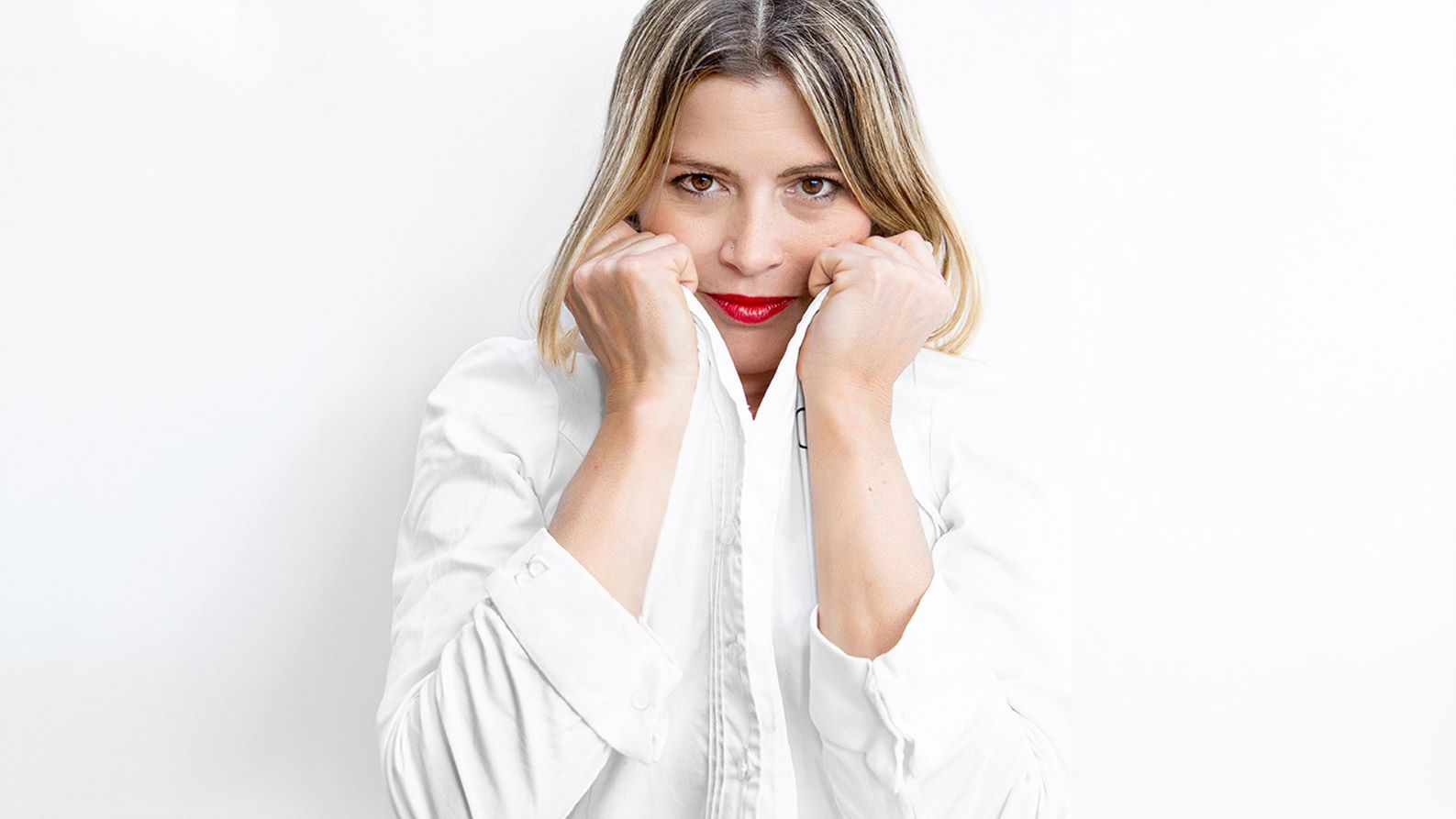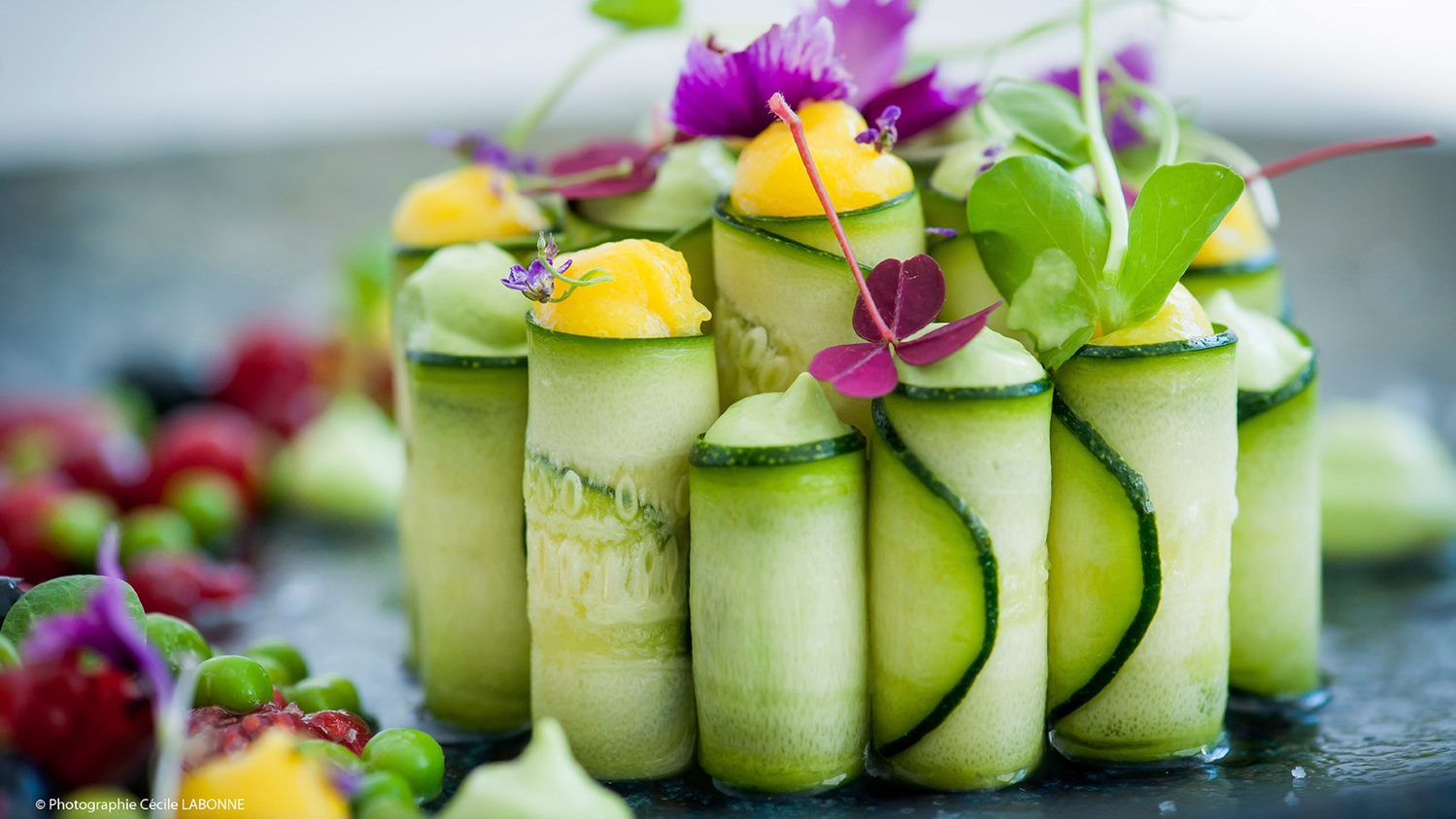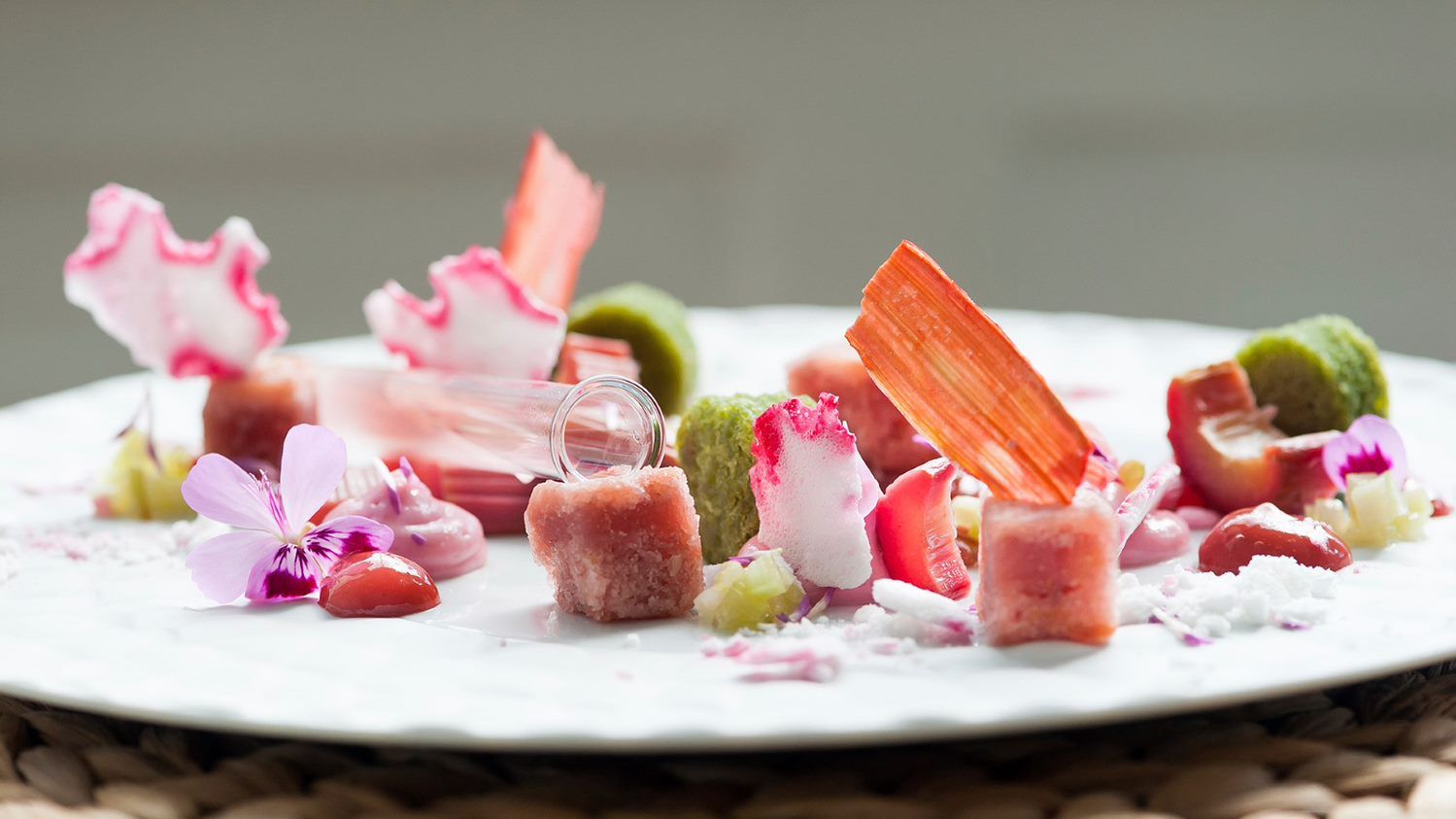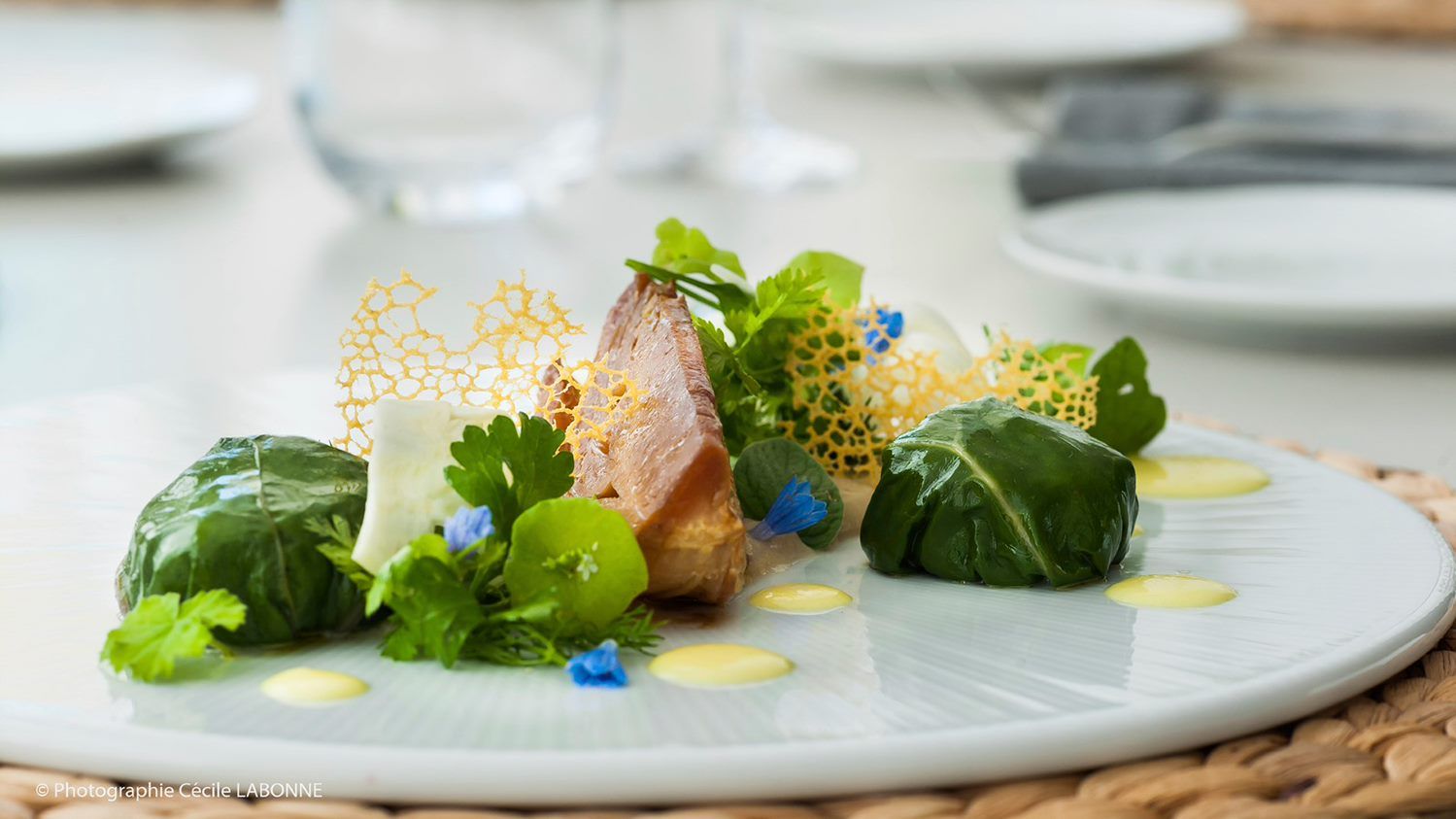-
INTERVIEW WITH CLAIRE VALLÉE, THE FIRST VEGAN MICHELIN AWARD-WINNING CHEF

Printemps.com: When you were younger, you wanted to be an archaeologist. How did you become a chef?
Claire Vallée: By complete chance—like many things in life! [laughs]. I moved to Switzerland when I was 26 to work a season alongside my archaeology studies, and I soon became headwaiter at a hotel in Crans-Montana. I stayed in that role for two years and one day, they asked if I wanted to transfer to the kitchen and work as a pastry chef. I accepted, because cooking has always interested me, ever since I was little. They trained me and I gradually climbed the ladder. I moved to another establishment, where the chef position was already filled. Then my employer informed me that the chef was leaving, and I absolutely had to take his place! "Either become the chef, or leave!" he told me [laughs]. I accepted, and that's how it all began.
At almost 30 years old, you are a chef. What was your daily life like at the time?
I was an unqualified, self-taught woman, who managed a team of boys... so it wasn't always easy, but I didn't give up and was able to carve out a place for myself. And then, the customers were very happy—no doubt because I tried to offer very creative dishes (which my employer had noticed). Aside from some set dishes, I had free rein to create, so I could really have some fun! I broke free. That's what cooking is about. It's a creative outlet.
Were you already vegan at that time?
Not at all! I was thinking of opening a gourmet restaurant, but not necessarily vegan. It was a trip to Thailand that introduced me to vegan cuisine. I went there when I was thinking of opening a restaurant, and once there, I realised that food could have a very cleansing and healthy side. What I also noticed was that the portions of meat and fish were quite small on the plate compared to the broth served with it, the vegetables, the tofu, the herbs... Over time, I completely stopped eating it and developed a real taste for vegan cooking.

Was it a revelation?
Yes! I knew about vegan cooking (or plant-based, as I prefer to call it), but I didn't know how it could become gourmet. In my mind, it was food for athletes who watch their figures. I had a very minimal view of it. Plus, I lived in places where we ate a lot of meat, which didn't help. So yes, it was a big discovery. Thailand showed me that there are other possibilities—you can use coconut milk instead of cream, for example—and it really made me think. As a result, when I returned to France, I couldn't stand eating animal fat, and creams... not to mention meat, which I had stopped eating during my trip.
Did you feel a disconnect with French cuisine when you returned?
Absolutely. I decided to move to Arès, where I took a chef position in a restaurant. It was there that I began to work with garnishes, vegetable or fruit-based sauces, herbs... Gradually, meat and fish (which I continued to cook, as required by my employer) became an accompaniment. They were no longer the main component of the dish. But I felt more in tune with plant-based cooking, and after two years, I decided to quit and open my own restaurant: ONA - the French acronym for "Not of Animal Origin."
Vegan restaurants are not very common in France, especially in rural areas. Did you encounter any challenges in starting your business?
The first challenge was money, because I didn't have any [laughs]. So I approached some banks that rebuffed me, saying that a vegan fine dining restaurant would never work in this region. I then went to the Bordeaux Chamber of Commerce and Industry, who advised me, and I began to apply for interest-free loans, which were accepted. Next, I started a crowd funding campaign, raising €10,000—a first in the region, raising such a large amount for a restaurant! And finally, I approached La Nef, an ethical community bank, who agreed to support me as a shareholder. So I managed to collect the amount needed to open the restaurant and then... I realise that there was all this restoration work to do, and there was a lot of it! [laughs] I couldn't use the fundraising money—I needed it to open the restaurant. So I launched a campaign asking for volunteers, and I found myself with 80 people to help with the work! In two months, everything was finished. The floors, the walls, the inside and outside was painted... Local businesses brought us food, people lent us equipment... it was amazing, especially for a vegan restaurant in Arès! [laughs] I picked up the keys on 31 August 2016, and on 22 October, ONA opened its doors.

So, you opened the first 100% vegan fine dining restaurant in France. Did you realise then that it was a ground-breaking business?
At first, I got the baby blues [laughs]. I had so many people around me from morning to evening for two months and all of a sudden, I was alone in the kitchen. It felt a little strange at first, but it quickly passed. And then I began to realise what was going on, seeing the buzz about the restaurant. I had so many press appearances; people were talking about it a lot. As a result, the restaurant was fully booked every evening for months! Within six months, Gault & Millau gave us an 11/20 rating in their guide, the equivalent of one toque, then 13/20 a month later, equivalent to two toques. And a year later, the Michelin Guide awarded us a Plate [a distinction created in 2016 symbolising a "pre-star"]. That's when it really hit home.
What do these prizes represent for vegan cuisine?
It's a wonderful acknowledgement by the profession. Because French cuisine is still very animal-based with butter, cream, dairy products, meat, fish... Vegetarianism has already made its way into French gastronomy—there are vegetarian starred chefs—but this has been a huge first for vegans, which until then had been perceived as quite bland and a little sad, with no place in French haute cuisine. With ONA, I wanted to show that through vegan food and other cooking techniques, there are infinite gourmet possibilities! The love of good food is very important in haute cuisine. That was the challenge, and I think it paid off.
You encourage enjoying your food, but also the healing properties of a plant-based diet.
Yes, absolutely. I only work with organic products from small local producers, so I also try to support the local economy, which I find interesting and more suited to our lifestyles. When customers leave the table, they ate seven gourmet dishes so they're definitely full, but they don't feel heavy... they feel that it has done them some good.
Can you tell us more about the food that you offer at ONA? What dishes might one find at your restaurant?
The menus change regularly. We have the market menu, which changes every week, and the gastronomic menu, which changes every month. We design them in line with the producers' harvest times, so when the seasons change, the menus follow. We create around twelve menus a year. At the moment, we have a menu called "All the mornings of the world" (like the film) with a slightly Japanese-style starter, featuring watermelon balls marinated in a ponzu sauce and grilled in a pan, cucumber balls marinated in an umeboshi sauce... There's also a wakame salad, with grapefruit, a vegan caviar made from tamari-marinated tapioca and some seaweed to give it saltiness, and a nettle and cucumber ravioli. And with all that, a watermelon-based gazpacho. I don't waste anything; if I'm working with a large vegetable and it won't all be used, I present it in another form. So here, I used the rest of the watermelon to make a raspberry gazpacho.

Where do you find your inspiration to create all these dishes?
My team often says that I never sleep, that I'm constantly searching for new ideas... which is not entirely false [laughs]. But ideas often come naturally. I see things, I mull them over, I digest them, and I transfer them onto the plate. I also need to be around people, discover things, be in nature, travel... In general, when I come home from a trip, I make a dish inspired by the place I went to. In fact, I was planning on going to Japan before lockdown, so I already had loads of ideas for a Japanese menu.
You recently reopened ONA after two and a half months of closing down due to lockdown. Did this period have an impact on the way you cook?
Absolutely. I'm quite hyperactive, with a need to create, so it's needless to say that it was very complicated for me [laughs]. After a few weeks, I said to myself that I absolutely had to keep busy, that I'll make takeaway meals and I thought about an idea I had in Thailand: Cooking burgers from around the world. So I threw myself into creating them. I made all the garnishes and all the bread possible... and desserts to go with them. I had never really made bread, but it worked, and I was spending all my time in the kitchen again. So it got better, especially since it was a big hit—I still receive requests for burgers [laughs]. In the end, that period was very enriching, because I came out of my comfort zone.
What are your plans for the rest of 2020?
I am currently preparing a book, but I can't say much about it right now, except that it will be a beautiful book. In the meantime, I'm dedicating myself to restarting ONA and doing everything to try and receive a Michelin star one day. It would be a world first for a vegan restaurant, so the whole team is keeping their fingers crossed.